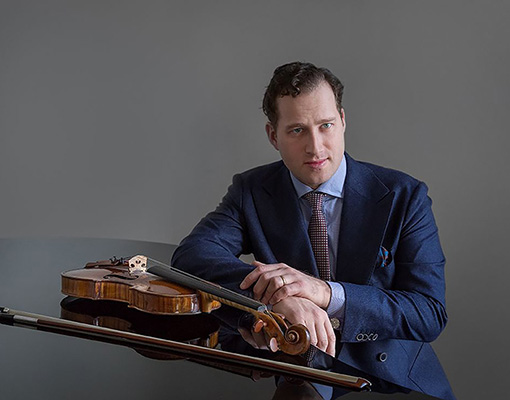Sunday afternoon is a nice time for a concert, and although the Usher Hall is only half full, those of us who made it are certainly enjoying it. It is nice to see an old friend in conductor Stéphane Denève, who was until recently Music Director of the RSNO, and he entertains us with his usual introductory remarks, which include a plug for his new CD. He also introduces us to the orchestra he now directs, the Brussels Philharmonic, but since they have become regular visitors to Edinburgh in recent years, maybe they too could count as old friends!
The concert opens with a new work by Mark-Anthony Turnage, best known for his opera Greek, which was originally premiered at the Edinburgh Festival, and was recently repeated there. This work, Passchendaele, was commissioned by the Concert Hall in Bruges to commemorate the 600,000 soldiers who died in Flanders, so it was very appropriate that it was being performed on Remembrance Sunday.
Turnage wrote the work to encourage young people to reflect on the war, and it is being played by youth orchestras in Europe and the US. It isn’t particularly sorrowful, although there are quiet passages, and it has a fair degree of melody for a modern work. Turnage says it was inspired more by the landscape of Flanders, and how it has covered up the sites of war.
This is followed by what is perhaps the most popular romantic violin concerto, that of Max Bruch, which is often top of the classical charts. It is beautifully performed by the young Danish violinist, Nikolaj Znaider, who brings out all the delicate tones and stunning melodies that have made it such a favourite of audiences. Denève makes sure the Brussels Philharmonic are fully in harmony with the soloist, and it gets a very warm reception from the Usher Hall audience.
After the interval, we are treated to a ballet favourite of Denève. He has arranged fourteen of Prokofiev’s Cinderella scenes into a suite (which also appear on his new CD!). This collection gives the essence of the early part of the ballet, up to when midnight strikes at the ball. Cinderella, along with Romeo and Juliet, has become one of the great ballet scores, and Denève and the Brussels Philharmonic give us a fine flavour of it.
This is followed by an even more colourful ballet suite, Ravel’s Daphnis et Chloé Suite No. 2. This ballet concerns the Classical Greek story of the goatherd Daphnis, and the shepherdess Chloe, and their tortured route to marriage. It contains some of the most vivid and colourful music of Ravel, and remember he was the composer of Bolero! The Brussels Philharmonic show their virtuosity in this suite, both as an orchestra and as fine soloists. Let’s hope their annual visits to Edinburgh continue, despite Brexit!


Comments